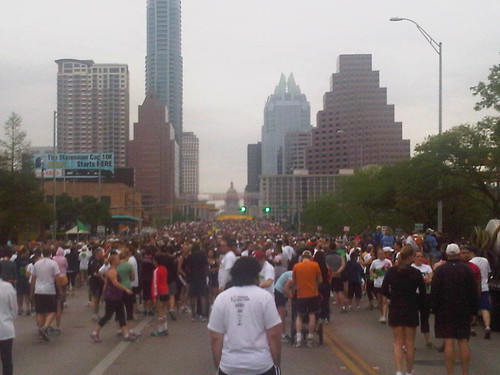 The debate rages amongst clinicians and students alike. Which is better - manual therapy (in all of its myriad of forms) or mechanical therapy (otherwise known as MDT, or the McKenzie Method)? For some reason, clinicians seem to be very polarized when it comes to their approach to orthopaedics. This makes for some rather entertaining dialogue between the factions involved.
The debate rages amongst clinicians and students alike. Which is better - manual therapy (in all of its myriad of forms) or mechanical therapy (otherwise known as MDT, or the McKenzie Method)? For some reason, clinicians seem to be very polarized when it comes to their approach to orthopaedics. This makes for some rather entertaining dialogue between the factions involved.
At the entry-level of education and beyond, students continually ask faculty which is "better". I have had physical therapy students sit in a classroom and debate, with great passion I might add (given their lack of experience), that one approach is better than the other. This extends to practicing clinicians that are also struggling with where to spend their continuing education dollars. It seems like it has evolved into an "us versus them" mentality. At best, it is an entertaining dialogue; at worst, a fine example of ignorance amongst well-educated clinicians.
One must be better, yes? Isn't that the way it has to be? Someone has to lose, no?
Is the great debate – manual therapy or mechanical therapy – just a great perceptual divide?
 “In my professional opinion, I don’t think you should be running.”
“In my professional opinion, I don’t think you should be running.”
It was the early 1980s. The words still ring loudly in my mind. I had experienced some knee problems during my growth spurt as an adolescent. I had my share of knee surgeries – and probably your share as well. I had a well-respected orthopedist who told me I should never run, but that it would be alright to swim or bike. How could I ever doubt “the expert”?
Not long after that, I became a physiotherapist. I focused my career on orthopedics and sports injuries. Countless patients over the years have been told the same things that I was told. They have put their faith in conventional thinking, in traditional medicine, much as we have been taught to do over the years. Many haven’t asked enough questions. All have come to me feeling frustrated and hopeless. I understand the feeling well, having been there myself.
But today, I stand here having just completed my 10th consecutive Capitol 10K in Austin. That’s 100K of running in one event alone over the past decade - not bad for a guy that shouldn’t be running at all, according to the experts. So how did this happen?
 You’ve sustained an injury. You don’t really know what to do. Perhaps you went to a family practice physician, an orthopedist, a massage therapist, a physical therapist, or a chiropractor. The more people you come into contact with, the more answers you receive regarding your problem. Your clinician may claim that injury recovery and treatment is as much an “art” as it is a science”. You may be prescribed a “protocol” that consists of a prolonged number of visits. Or you might receive the most common answer: “stop what you are doing and let’s wait and see”.
You’ve sustained an injury. You don’t really know what to do. Perhaps you went to a family practice physician, an orthopedist, a massage therapist, a physical therapist, or a chiropractor. The more people you come into contact with, the more answers you receive regarding your problem. Your clinician may claim that injury recovery and treatment is as much an “art” as it is a science”. You may be prescribed a “protocol” that consists of a prolonged number of visits. Or you might receive the most common answer: “stop what you are doing and let’s wait and see”. Health care is a service industry. It is incumbent upon the provider of the service to aim to give you the best possible experience – just like any other service industry. But as consumers, we’ve lost our way. First of all, there is a growing chasm between “accepted standards” – and “evidence-based standards”. This drives our expectations - one of the primary issues surrounding health care consumerism. If you have been told by the health care marketplace, the media, and countless other lay articles, that time and countless visits is the standard, then your expectations will reflect this. However, accepted community standards of care are not the same as evidence-based standards of care. Our bottom line, our expectations, need to rise to reflect the standards found within the science of medicine.
So let’s start with a few “reality checks” and basic elements of consumerism when it comes to health care.
 Based on the numbers involved, I think that back pain could form it’s own nation. It has a large community of people that are speaking the same language and are bound by common factors. There is also a rather large fiscal component that binds the community together.
Based on the numbers involved, I think that back pain could form it’s own nation. It has a large community of people that are speaking the same language and are bound by common factors. There is also a rather large fiscal component that binds the community together. We could call this new independent nation Backpainia (for lack of a better name). Maybe it could start as the 51st state of the US, and then seek its independence from the tyranny of, oh, lobbyist-driven health care.
But take heed, resolute citizens of Backpainia. Revolution is taking place throughout the world. Be it Egypt, Libya, or any of a plethora of nations, change is upon us. Something is also amiss in Backpainia – perhaps it is the next nation in need of a revolution?
The research data and socioeconomics of this nation explain everything.
 In a previous article, I presented four reasons to reject palpation-based models of care. This is no longer an issue of evidence - or lack thereof. There is plenty of research to debate not only the reliability and validity of palpation-based approaches to care, but also passive approaches to care in general. If you have a passive treatment approach, then the patient runs the risk of becoming dependent upon the care of the health guru in order to attain a resolution of their problem.
In a previous article, I presented four reasons to reject palpation-based models of care. This is no longer an issue of evidence - or lack thereof. There is plenty of research to debate not only the reliability and validity of palpation-based approaches to care, but also passive approaches to care in general. If you have a passive treatment approach, then the patient runs the risk of becoming dependent upon the care of the health guru in order to attain a resolution of their problem.Sadly, many of the assessment and treatment approaches found in the current market place are exactly that – palpation-based and passive in nature.
What is truly at stake in all of this is far more elemental. It is the issue of perception – of the role of the clinician in the care of the patient. Is it as a health guru … fixer and healer? – or as a health mentor … problem solver, investigator, teacher, coach, and educator? The future of effective and optimal health care requires a reality check. The solutions lie in the perceptions of the clinicians, the educators, and the consumers themselves.
 In 1997, I presented the results of a study on spinal evaluation techniques at the 5th McKenzie Institute International Conference in Philadelphia. The purpose of the study was to survey entry-level physical therapy educational programs regarding the spinal evaluation techniques that were taught to their students. The survey went out to all of the physical therapy educational programs in the United States, Canada, UK, Australia, and New Zealand.
In 1997, I presented the results of a study on spinal evaluation techniques at the 5th McKenzie Institute International Conference in Philadelphia. The purpose of the study was to survey entry-level physical therapy educational programs regarding the spinal evaluation techniques that were taught to their students. The survey went out to all of the physical therapy educational programs in the United States, Canada, UK, Australia, and New Zealand. To briefly summarize the results, it was found that most physical therapy programs worldwide place a very heavy emphasis on teaching palpation skills and palpation-based assessment and treatment models. These would include massage, manual mobilization, active release therapies, trigger points, and the like. Not much has changed from my own PT education in the ‘80s all the way to current 2011 educational programs. The same focus on palpation skills holds true for the educational programs of chiropractors, massage therapists, and many other alternative therapies.
But there are some major reasons to debate and reject palpation-based assessment and treatment approaches. The scientific literature on palpation has been very well-documented over the years – and the results will probably surprise you.
 Note: This post is an adaptation of an article that I wrote for the February 2011 issue of the Austin Runner’s Club Newsletter.
Note: This post is an adaptation of an article that I wrote for the February 2011 issue of the Austin Runner’s Club Newsletter.
When training for or competing in any event, be it your first 5K or your 10th marathon, there are always going to be some nagging aches and pains. It is a reality of training. As you place demands on your body, it has to then recover from the training sessions and adapt to the imposed demands. During this cycle of training and recovery, your muscles, bones, and tissues undergo transformation. There may be times when the rate of recovery and adaptation is diminished relative to the actual training demands. It is at this time that an “over-use” or “under-recovery” injury may occur.
But how do I know that what I am experiencing is an injury? I have little aches and pains all the time. I need to know which aches and pains should be considered an injury that would benefit from the advice of a health care provider – and those which don't require that level of attention. And I definitely don't want whatever this is to limit my training. How do I know that this is something that I need to have assessed?
 "Running Injuries: Etiology And Recovery- Based Treatment" (co-author Bridget Clark, PT) appears in the third edition and fourth editions of "Clinical Orthopaedic Rehabilitation: A Team Approach" by Charles Giangarra, MD and Robert C. Manske, PT.
"Running Injuries: Etiology And Recovery- Based Treatment" (co-author Bridget Clark, PT) appears in the third edition and fourth editions of "Clinical Orthopaedic Rehabilitation: A Team Approach" by Charles Giangarra, MD and Robert C. Manske, PT.
 Allan Besselink, PT, DPT, Ph.D., Dip.MDT has a unique voice in the world of sports, education, and health care. Read more about Allan here.
Allan Besselink, PT, DPT, Ph.D., Dip.MDT has a unique voice in the world of sports, education, and health care. Read more about Allan here.
 Top 5 finalist in three categories: "Best Overall Blog", "Best PT Blog" and "Best Advocacy Blog".
Top 5 finalist in three categories: "Best Overall Blog", "Best PT Blog" and "Best Advocacy Blog".